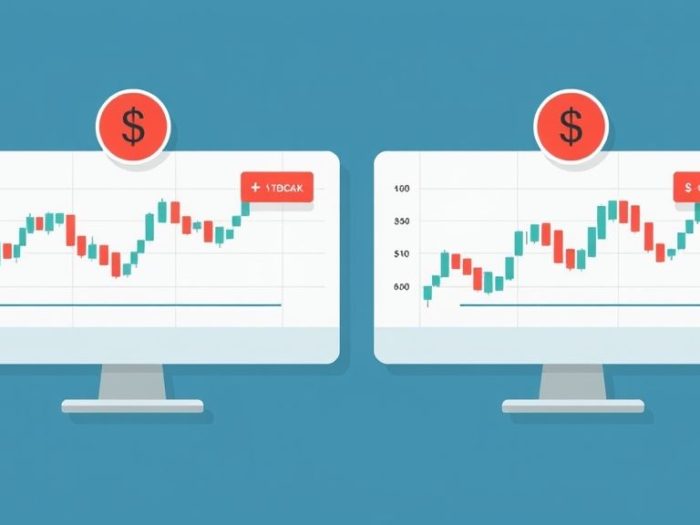Options trading offers diverse opportunities, and a key decision for traders is whether to
trade options on ETFs (Exchange-Traded Funds) or individual stocks. Both have pros and cons,
and the “most profitable” choice depends on various factors. This article compares options
on ETFs and individual stocks to help you make an informed decision.
Understanding Options on ETFs
ETFs are investment funds that trade on stock exchanges, holding a basket of underlying
assets. Options on ETFs allow you to trade options on the price movement of the ETF itself,
rather than a single stock.
Pros of ETF Options
- Diversification: ETFs provide instant diversification across multiple stocks or assets, reducing company-specific risk.
- Liquidity: Options on major ETFs like SPY (S&P 500) or QQQ (Nasdaq 100) are highly liquid.
- Lower Volatility (Generally): ETFs tend to be less volatile than individual stocks, especially those tracking broad market indices.
- Economic Exposure: ETFs offer exposure to specific sectors or market segments.
Cons of ETF Options
- Limited Upside (Potentially): May not offer the same explosive growth potential as individual stocks.
- Tracking Error: ETFs may not perfectly track their underlying index.
Understanding Options on Individual Stocks
Individual stock options give you the right to trade options on a single company’s stock.
Pros of Individual Stock Options
- Higher Upside Potential: Individual stocks can experience significant price swings, offering the potential for high returns.
- More Control: You can select options based on your analysis of a specific company.
Cons of Individual Stock Options
- Higher Risk: Individual stocks are more volatile and susceptible to company-specific news and events.
- Less Diversification: Increased risk due to lack of diversification.
- Lower Liquidity (Sometimes): Options on smaller or less actively traded stocks can be illiquid.
ETF Options vs. Individual Stock Options: Which is More Profitable?
There’s no single answer to which is “more profitable.” Profitability depends on several factors:
1. Risk Tolerance
- Higher Risk Tolerance: Individual stock options offer the potential for higher returns but also carry greater risk.
- Lower Risk Tolerance: ETF options may be more suitable for those seeking less volatile, diversified exposure.
2. Trading Style
- Active Trading: Individual stock options may be preferred for active traders seeking to capitalize on short-term price movements.
- Long-Term Investing: ETF options can be used for longer-term strategies focused on market trends.
3. Market Conditions
- Bull Market: Individual stocks may outperform in a strong bull market.
- Bear Market: ETF options, especially on broad market indices, can be used for hedging in a bear market.
Examples
- ETF Options: Buying call options on the QQQ to profit from a rise in the tech sector.
- Individual Stock Options: Selling put options on a specific company you believe is undervalued.
Conclusion
Both ETF options and individual stock options offer unique advantages and disadvantages.
The “most profitable” choice depends on your risk tolerance, trading style, and market
outlook. Carefully consider your investment goals and choose the option type that best aligns
with your strategy.
Related Keywords
ETF options, stock options, options trading, options trading strategies, SPY options, QQQ
options, options trading for beginners, options trading risk, options trading income, options
trading guide.
Frequently Asked Questions (FAQ)
1. What are ETF options?
ETF options are options contracts that are based on the price movement of an
Exchange-Traded Fund (ETF), which holds a basket of underlying assets.
2. What are the advantages of trading ETF options?
Advantages include diversification, high liquidity, and generally lower
volatility compared to individual stocks.
3. What are the disadvantages of trading ETF options?
Disadvantages include potentially limited upside compared to individual stocks
and the possibility of tracking error.
4. What are individual stock options?
Individual stock options are options contracts that are based on the price
movement of a single company’s stock.
5. What are the advantages of trading individual stock options?
Advantages include the potential for higher returns from significant price
swings and more control over selecting options based on your analysis of a
specific company.
6. What are the disadvantages of trading individual stock options?
Disadvantages include higher risk due to increased volatility and less
diversification, and sometimes lower liquidity.
7. Which option type is generally less risky?
ETF options are generally less risky due to the diversification they provide.
8. Which option type offers more upside potential?
Individual stock options can offer more upside potential, but also carry higher
risk.
9. Which option type is better for active trading?
Individual stock options may be preferred for active traders seeking to
capitalize on short-term price movements.
10. Which option type is better for long-term investing?
ETF options can be used for longer-term strategies focused on market trends
and diversification.



